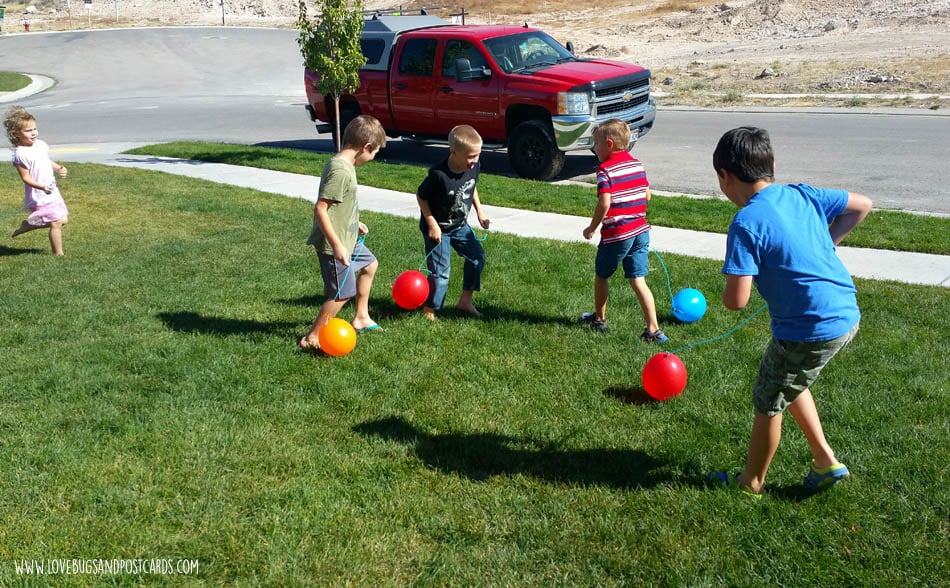
To listen to today’s reflection as a podcast, click here
Balloon stomp is a pretty straightforward game.
Start with a group of children. Tie an inflated balloon to the leg or ankle of each child. Then shout “Go!”
The kids descend upon each other’s balloons, trying to pop them with a hearty stomp – all the while defending their own balloon from would-be stompers.
In the end, there’s just one winner – the child with the last remaining intact balloon. Everyone else loses. Unless, of course, you play team balloon stomp, in which one team wins and everyone else is left looking forlornly at their deflated hopes.
Author and pastor John Ortberg suggests that balloon stomp “is a Darwinian concept, the survival of the fittest.” The battle is over in a matter of seconds. The one who wins is usually the most (secretly) disliked kid in the group. “It’s hard to really win at balloon stomp,” Ortberg concludes.
In his book Taking the Word to Heart, Robert Roberts describes what happened when a group of developmentally challenged kids were introduced to the same game. Each got a balloon. The leader yelled “Go!” Afterwards, one of the onlookers admitted, “I got a sinking feeling in my midsection. I wanted to spare the kids the pressure of a competitive brawl.”
Then something unexpected happened.
Maybe the instructions were given a little too quickly. Maybe, with this group of kids, a few extra minutes would have helped them grasp the rules. The one thing that registered with everyone was that the balloons needed to be popped. So that’s exactly what the kids set out to do.
But of course, they were doing it wrong:
Instead of battling each other as competitors, they decided to help each other pop all the balloons – even their own. One boy was getting frustrated as he struggled to pop one of the girls’ balloons. So she helped him by holding the balloon steady. Success! Then he held his own balloon so she could return the favor. Big smiles from both.
The kids worked together until not a single inflated balloon remained. Everybody cheered.
So, who won? Everybody won.
Ortberg remarks, “What happened was that they had actually devised a brilliant alternative scoring system. In the new system, students didn’t score points against each other but with each other. People who looked at each other as opponents in the old system became teammates in the new one. People who looked like losers in the old system became winners in the new one.”
Make no mistake: It matters how we keep score. The way we keep score defines reality.
From our earliest years, we learn what kinds of accomplishments earn applause and rewards. Our parents, by granting or withholding smiles and approval, let us know that they have some kind of scoreboard in mind. Then come teachers, coaches, report cards, peer groups, SAT scores, bosses, paychecks, spouses, and retirement accounts.
We grow up wondering, “How am I doing? And how’s everybody else doing?”
We belong to a culture that is incurably fascinated with Money, Sex, and Power. The cool people are rich and beautiful and influential. That’s how you end up on one of those magazine covers at the airport canteen.
If only pastors were insulated from such rubbish. When standing around with other pastors, we tend to default to the ABCs: Attendance, Building, and Cash (or, if you like, Bodies, Bricks and Bucks). “We just added 40 new members. They love our new atrium, and we actually paid it off a year in advance. So, how are things at your church?”
Why do we bother making such statements, instead of sincerely inquiring about the condition of our brothers and sisters’ souls?
For just a few moments, it makes us feel as if we’re winning.
But the Bible makes it clear that Jesus introduced a new way to keep score.
The apostle Paul lays it out in his letter to the Philippians:
“Think of yourselves the way Christ Jesus thought of himself. He had equal status with God but didn’t think so much of himself that he had to cling to the advantages of that status no matter what. Not at all. When the time came, he set aside the privileges of deity and took on the status of a slave, became human! Having become human, he stayed human. It was an incredibly humbling process. He didn’t claim special privileges. Instead, he lived a selfless, obedient life and then died a selfless, obedient death—and the worst kind of death at that—a crucifixion” (Philippians 2:5-8, The Message).
The most Godlike thing a human being can do is serve others in self-giving love.
Ortberg points out that Jesus forever redefined foot-washing. In a sandals-and-bare-feet society, the foot was considered the dirtiest part of the body. Washing feet was reserved for slaves. From time to time, a child might do it for their parents as an extraordinary expression of devotion. There is exactly one story from the ancient world in which a wife washed her husband’s feet.
But there is no account of a superior, a master, or a rabbi washing the feet of his associates or students.
Except for one.
On the night before he died, Jesus washed the feet of his disciples.
Then he said, “This is how I want you to live with each other. In my Father’s scoring system, this is what it means to win.”
And the best side-effect?
When it comes to hyper-competitive impulses, it’s the perfect way to burst our balloons.
